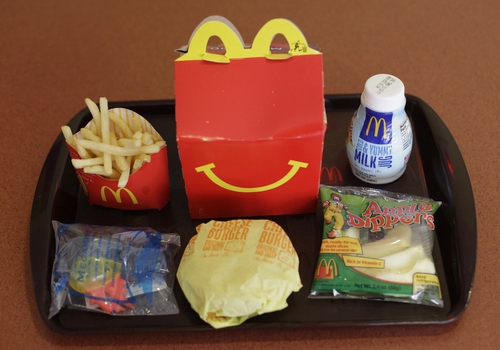
The fast food industry continues to be one of the most powerful forces in the U.S. and across the globe, affecting not just the daily lives of people who work and eat there but the communities in which they operate.
With that in mind, it's a given that the actions of these companies have more far-ranging consequences than simply their bottom line -- they affect the environment, workers and their families and the health of people across the board.
We'd like to see fast food juggernauts like McDonald's, Taco Bell, KFC, Burger King, Wendy's and others make resolutions for 2013 to improve themselves in these areas and more.
1. Pledge To End Use Of Gestation Crates
A slew of companies this year announced timetables to stop buying meat from producers that use gestation crates, including big-name chains like McDonald's, Burger King, Denny's and others, but there are still plenty more that haven't yet seen the light. Domino's, for one, has gone so far as to publicly reject any plans to phase out the use of such crates.
The practice, which involves confining female pigs in cramped, uncomfortable conditions for nearly the entirety of their lives, has been decried as inhumane by multiple animal rights groups. In 2013, we'd like to see more folks in the food service industry take a stand against it.
2. Dedication To Moving Toward Sustainability
Achieving sustainability is a tall order, and much trickier than most people likely realize. The Huffington Post reported this year that the term itself is hard to pin down when it comes to some ingredients --as it stands, a global definition for beef sustainability is impossible.
But that hasn't stopped companies like McDonald's from publicly stating the importance of sustainability and, in a spokesman's words, "accept[ing] the responsibility that comes with [its] global presence." We'd like to see more food service companies stepping up to the plate, particularly chains with a global presence. That means using sustainable ingredients where possible and being a part of the sustainability discussion.
3. Increased Transparency
We're all for knowing more about what we're eating. Thanks to an Obamacare mandate, chain restaurants will soon be required to post the calorie counts of menu items. The mandate, passed in 2010, will be enforced beginning in March of 2013.
That's good news, especially considering that some chain salads are less healthy (calorically) than a Big Mac. Still, we applaud companies that take transparency a step further with special ad campaigns, like the one run by McDonald's Canada this year. We'd like to see other companies follow suit.
4. Better Treatment Of Workers
The strike of fast food workers in New York City in late November is just one symptom of the widespread discontent among the members of the fast food community, who say the low-wage industry's franchise structure makes it difficult to unionize.
According to the National Employment Law Project, the majority of low-wage workers in the U.S., about 66 percent, work for large corporations like Walmart, McDonald’s and Yum! Brands. In the new year, we'd like to see wages -- and worker satisfaction -- rise.
5. Reevaluation Of Kid-Orientated Marketing
In late 2011, San Francisco banned fast food toys in an effort to discourage children from making unhealthy choices. At the time, HuffPost San Francisco wrote that the reasoning for the ban was that the "inclusion of an incentive item unfairly targets marketing at children who are unable to make healthy decisions for themselves."
Although the menus at these fast food establishments didn't change, it was determined that the promotion of healthy items increased at these locations. We'd like to see more companies doing the same, or doing something else substantial to encourage children to eat healthily.





